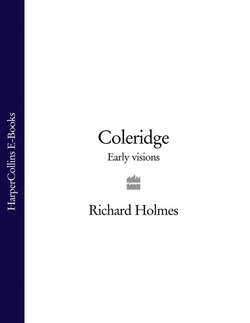Читать книгу Coleridge: Early Visions - Richard Holmes - Страница 25
THREE PRODIGAL SON 1
ОглавлениеColeridge was just nineteen when he went up to Jesus College, Cambridge in the autumn of 1791. Though academically outstanding, there was little in his letters or adolescent poetry to suggest any real creative originality by this age (compared for example with Shelley or Keats). With characteristic acuteness, he himself later remarked on this.1 He was widely read, marvellously articulate, noisily self-confident but lacked any driving sense of literary vocation. Outwardly gregarious, as Lamb remembered, he was also an intensely lonely young man who longed for friendship. His unhappy family background, and growing sense of being an orphan in the world, made him even more emotionally volatile and self-conscious than most students. He referred jocosely to his “fat vacuity” of face, and his frequent blushes.
In his letters to George, and especially to the Evans family, there is overwhelming evidence of his passionate desire for intimacy and acceptance. The almost hysterical intensity of this, at times, may itself have been an alienating factor for fellow students. Self-dramatising and self-mocking by turns, he was like some brilliant overgrown child, performing ceaseless exhausting parlour games for his elders, and never settling down. He danced and jumped on his own shadow – sitting scholarship exams, writing for poetry prizes, dabbling in university politics, running up disastrous debts, flirting with drink, whores, and suicide – and all the time seemed to know that the performance was somehow hollow, a dazzling demand for attention, sympathy, and recognition. Yet in the process something real and extraordinary did happen: it released the language of his imagination, at first in his letters, then gradually in his poetry.
The opening note of this commedia of university life was struck, very early on, with almost conscious design, in his first letter from Jesus College to Mrs Evans and her daughters, written in February 1792.
Believe me, that You and my Sisters have the very first row in the front box of my Heart’s little theatre – and – God knows! you are not crowded. There, my dear Spectators! you shall see what you shall see – Farce, Comedy, & Tragedy – my Laughter, my Chearfulness, and my Melancholy. A thousand figures pass before you, shifting in perpetual succession – these are my Joys and my Sorrows, my Hopes and my Fears, my Good tempers, and my Peevishnesses: you will however observe two, that remain unalterably fixed – and these are Love and Gratitude. In short, my dear Mrs Evans! my whole heart shall be laid open like any sheep’s heart…Come Ladies! will you not take your seats in this play house?2
